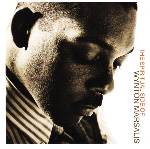Wynton Marsalis has fashioned one of the more intriguing careers in jazz history. The brightest product of one of the greatest of New Orleans’ fabled musical families, Marsalis became the most visible figure of a new generation of jazz musicians who emerged in the ’80s under the sobriquet “The Young Lions.”
It seems like a millennium ago that Marsalis released his eponymous debut album, back in the day before CDs existed. The record received near-universal acclaim. Listeners were awed by the neo-classical poise of the quintet, fronted by Wynton on trumpet and brother Branford on saxophones. Wynton was already a formalist, a keen historian who’d established his bona fides as a classical musician before launching his career as a jazz leader. The record has since been eclipsed by Wynton’s many accomplishments, but as a touchstone, a turning point in jazz history, its impact cannot be minimized. Though his playing was strong and beautiful, it was Wynton’s intent that made the record important. After jazz endured a period of growing pains in the ’70s trying to stay relevant in a popular-music market dominated by electric guitar-driven hard rock, Marsalis outlined a strategy for young jazz musicians to return to a style informed by New Orleans traditional jazz, swing, gospel and blues forms as well as bop. Acoustic jazz played in the shadow of the greats by young musicians for their peers with the style and cachet of contemporary fashion.
Marsalis epitomized the oversimplified-but-enduring image of jazz legacy being handed across the generations by a series of great trumpeters—King Oliver, Louis Armstrong, Roy Eldridge, Dizzy Gillespie, Miles Davis … and Wynton. Ken Burns enforced this mythology in his documentary series Jazz, which reflected Wynton’s hand at every turn. Davis was the greatest popularizer of fusion-jazz and the most youth-centered jazz musician when Wynton emerged. Early in his career, Wynton seemed obsessed with cutting Davis in open competition. He achieved that moment in dramatic fashion during the 1989 New Orleans Jazz and Heritage Festival, when he overwhelmed a late-period Davis electric group on a double bill, debuting one of his early masterpieces, Majesty of the Blues.
Marsalis will eventually be treasured not for his abilities as a soloist but for his ideas, his leadership and his enduring compositions. He is a master conceptualist who has turned out a mind-boggling series of great works—operas, ballets, suites, soundtracks—a cornucopia that is feeling Ellingtonesque at this point.
Marsalis often projects his ideas into stage presentations as director of Jazz at Lincoln Center and the jazz orchestra that tours under that name. The Spiritual Side of Wynton Marsalis is an album released to accompany “Abyssinian: A Gospel Celebration Tour” by the orchestra and the 70-voice Chorale le Chateau. The album is the perfect illustration of Marsalis as an architect of ideas—these tracks, taken from numerous sources over the course of his recording career, share such common ground as to make them all of a piece. Not so much a greatest hits album, Spiritual Side is Marsalis curating his own history. Cassandra Wilson’s vocal on “Oh What a Friend We Have in Jesus,” from Blood on the Fields, was a career-defining moment for her. Five selections come from one of Wynton’s greatest albums, the gospel tribute In this House, On this Morning. Perhaps the best moment on the album is another, previously unreleased, track from those sessions, a glorious six minute-plus rendition of “Precious Lord, Take My Hand” by Marion Williams, who would die the following year. It’s a measure of Marsalis’ greatness that a 20-year-old performance of such magnitude remained in the can until now.





